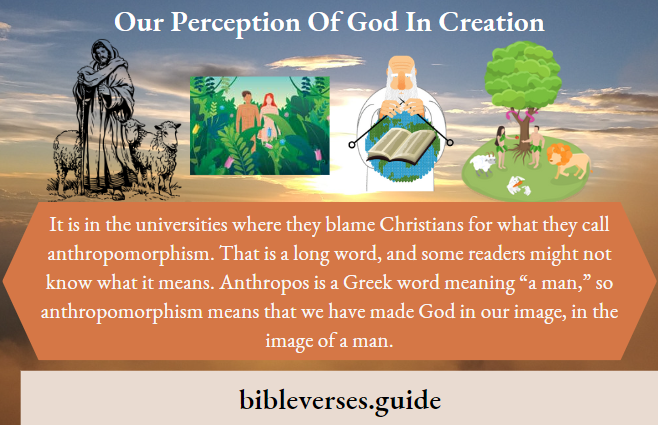Our Perception of God in Creation
All of creation, O Lord, sings of Thy praise. I look to the hills and think of Thee. The mountains show Thy majesty and strength. From the rivers, I see the flowing grace and goodness of Thy very nature. All creation joins in praise unto Thee, and so do I. Amen.
God’s fingerprints are all over creation. The more we delve into the mystery of creation, the more we begin to see God’s fingerprints. Not all scientific discoveries can eliminate it; they only strongly suggest that behind everything is a creator. To disavow a creator is to compromise intelligence. Nothing has appeared without something or someone behind it.
Who is this creator behind everything? is the question that really needs to be answered. This creator is the God who created all things, and He created everything with a purpose.
Nothing throughout all creation is meaningless or purposeless. I will never be able to understand the purpose until I understand who is behind all of this.
Unfortunately, we have left nature and creation to the scientists who are trying to unravel the mystery of our universe. It is my opinion that nature should automatically lead us to God, who is described to us in the Word of God as the Creator. If you have nature without the Word of God, you have a mysterious somebody, but no personal connection.
Read and Learn More Things That Delight The Heart Of God
I do not approach this as a scientist, but as one who is deeply in praise and worship of the creator. Everything in creation sings the praises of this mysterious creator. I cannot explain creation, but I can see through creation the marvelous fingerprints of a God who is magnificent, awesome, and wonderful.

All we do is take the best qualities in a man and project them upward, and then we have God. If we see a kind man, we say, “All right, then God must be kind,” and we project that kindness out of the heart of man up to God and say, “God is kind, and He is infinitely kind,” and then we preach and teach about it.
When critics say our concept of the heavenly Father is only a manufactured one, they say, in effect, “I know that God isn’t the way you say He is.” To answer that, ask, “All right, how did you find that out? You can only find it out by either discovery or revelation.
When did you discover God so that you can tell us what kind of God He is, if you did not discover Him, then you had a revelation. Will you please tell us where the revelation came from? What is the revelation?”
It presumes that the critic knows something about God that we do not know, the Bible doesn’t know, the prophets and apostles did not know, Jesus our Lord did not know, and church fathers and martyrs and reformers did not know.
People might also call you an anthropomorphic obscurantist, meaning you cover things up and keep them obscure. We do not believe that. We believe sinners cover things up and keep them obscure, and that the children of God do all things in the light.
The obscurantist is the one right now who is sitting somewhere drawing up a dirty contract, a crooked contract to cheat a widow out of her property. There is your obscure fellow. He is hiding in the darkness, but the children of the light come into the light.
When I say God is love, they say, “That’s what you would like to have God be like, and because you like to see love in people, you like to see love in God.” The whole thing is nonsense to me.
If God made man in His image, is it not reasonable to believe that the best things in a man would be the nearest to what God is? If you would like to see a mother showing tenderness over her baby, then where do you suppose she got that tenderness?
That love we have for each other, where did we get it? That pity we show for one another, where did we get it?
We got it all where we got our life. We got it from God, and though we are fallen and lost, this decency came from the heart of God.
“If ye then, being evil, know how to give good gifts unto your children, how much more shall your Father which is in heaven give good things to them that ask him?” (Matthew 7:11).
So instead of running and hiding and admitting we are ignorant, we stand right up to these critics and name-callers and say, “Keep your long names. I believe in God and I believe God made me in His image, and I believe that every good there is in humanity came from God.”
God is not the goodness that humanity has projected upward. The man was made in the image of God, and any decency that may be left in our fallen nature came from the heart of God.
God is kind, and this is taught or implied throughout the entire Scriptures.
You studied the multiplication tables—2 x2 = 4, 2×3 = 6, 2×4 = 8, and so on—those are data, mathematical facts. They will remain the same for the rest of your life. Right on up through to the highest possible reaches of mathematics, it will still be true that 2×2 = 4.
Then there is this datum of truth: God is good. You can go out into the world and see accidents, polio, murders, and all the rest, and when it is all finished, it does not change the fact that God is good.
You can go down where men cheat each other and lie and misuse figures for their purposes and make 2 x 2 = 7 so they can fill their own pocketbook, but that does not change the fact that 2×2 = 4.
Therefore, you can see everywhere among men that they have fallen in evil ways. You can see cruelty and darkness, but it does not change the fact that God is good. That is the datum of truth. It is a foundation stone of all our beliefs about God.
It is necessary for human sanity to believe that God is good— that the God who is in the heavens above is not a malicious
God or an unkind God or a God who promotes evil, but a God who promotes good. To allow God to be any other kind of God would be to upset and completely change our moral standard for mankind.
It would mean turning heaven into hell and hell into heaven. It would mean that good could be bad and bad could be good, and God could be the devil and the devil could be God.
Many times we try to rest our faith on texts and promises. True faith can rest only on the character of God. I believe, and I have faith because I believe in the One in whom my faith is placed.
I believe in a God who is good, and I never worry that God, behind my back, will mistreat me. I never need to worry for fear God will catch me when my back is turned and do something malicious, for there is no malice in the heart of God, only love. There is only goodness in the heart of God; that is all. Therefore, I need not worry.
Oh, what a contrast between the Christ who walked among men and the evil men among whom He walked—the malicious, beard-pulling, whispering men and the calm, quiet, loving Jesus with a tender look on His face for every harlot at His feet, every babe on the lawn, every sick child, and every pain and sorrow in the world.
He walked among men with goodwill, and the men among whom He walked accused Him of His goodness and wished He were dead.
When they nailed him on a tree, they did not change His goodness. He did not turn on them and curse them. He said, “Father, forgive them, for they know not what they do.” They could kill Him, but they could not destroy the goodness in His heart, His goodwill toward men.
I would like to point out something you may have overlooked. It is that God’s goodness is the grounds of our expectation. We evangelicals have gone overboard and thrown out some very wonderful treasures.
Our Puritan fathers and the old Presbyterians and Congregationalists and Baptists and Methodists used to preach about what they called natural theology and they did not hesitate. They were not liberals or modernists; they were the church fathers and taught what they called natural theology.
They said that God revealed himself in nature and that there was a theology that could be built just by looking around you. We all know that is true, but we are afraid to say that today; we are scared stiff.
We are afraid somebody will come along and beat us over the head with a Scofield Bible and say, “Now, wait a minute here—you’re a liberal.” No, no, my brother, I am no liberal. I hope I am liberal, but I am not liberal in theology, and I am not a modernist.
But I believe that God has, through His creation, declared certain things to be true of himself. I know the Psalms say so, and the prophets say so, and Paul says so. When I go along with an apostle of the New Testament, a prophet of the Old Testament, or a psalmist of both testaments, I feel that I am in pretty good company, and I am not too badly frightened.
I take great comfort in the fact that this is my Father’s world. When sin came into the world, it brought into creation an element contrary to the character and nature of God. The apostle Paul put it this way, “For we know that the whole creation groaneth and travaileth in pain together until now” (Romans 8:22). Even nature is suffering because of the sin of man.
What this world of ours will be like when sin has been finally and eternally removed from all creation is something we can hardly think of. Let them think of us as they will, and let them call us what they will. Our hope is in the fact that this is our Father’s world, and He has this world’s best interest in mind that will stand throughout all eternity.
This is My Fathers World
This is my Father’s world,
And to my listening ears;
All nature sings and round me rings The music of the spheres.
This is my Father’s world:
I rest in the thought
Of rocks and trees, of skies and seas;
His hand the wonders wrought.
This is my Father’s world,
The birds their carols rise,
The morning light, the lily white,
Declare their Maker’s praise.
This is my Father’s world,
He shines in all that’s fair;
In the rustling grass I hear Him pass;
He speaks to me everywhere.
This is my Father’s world,
O let me ne’er forget
That though the wrong seems often so strong,
God is the Ruler yet.
This is my Father’s world,
The battle is not done.
Jesus, who died, shall be satisfied,
And earth and heaven be one. -Maltbie D. Babcock(1858-1901)
